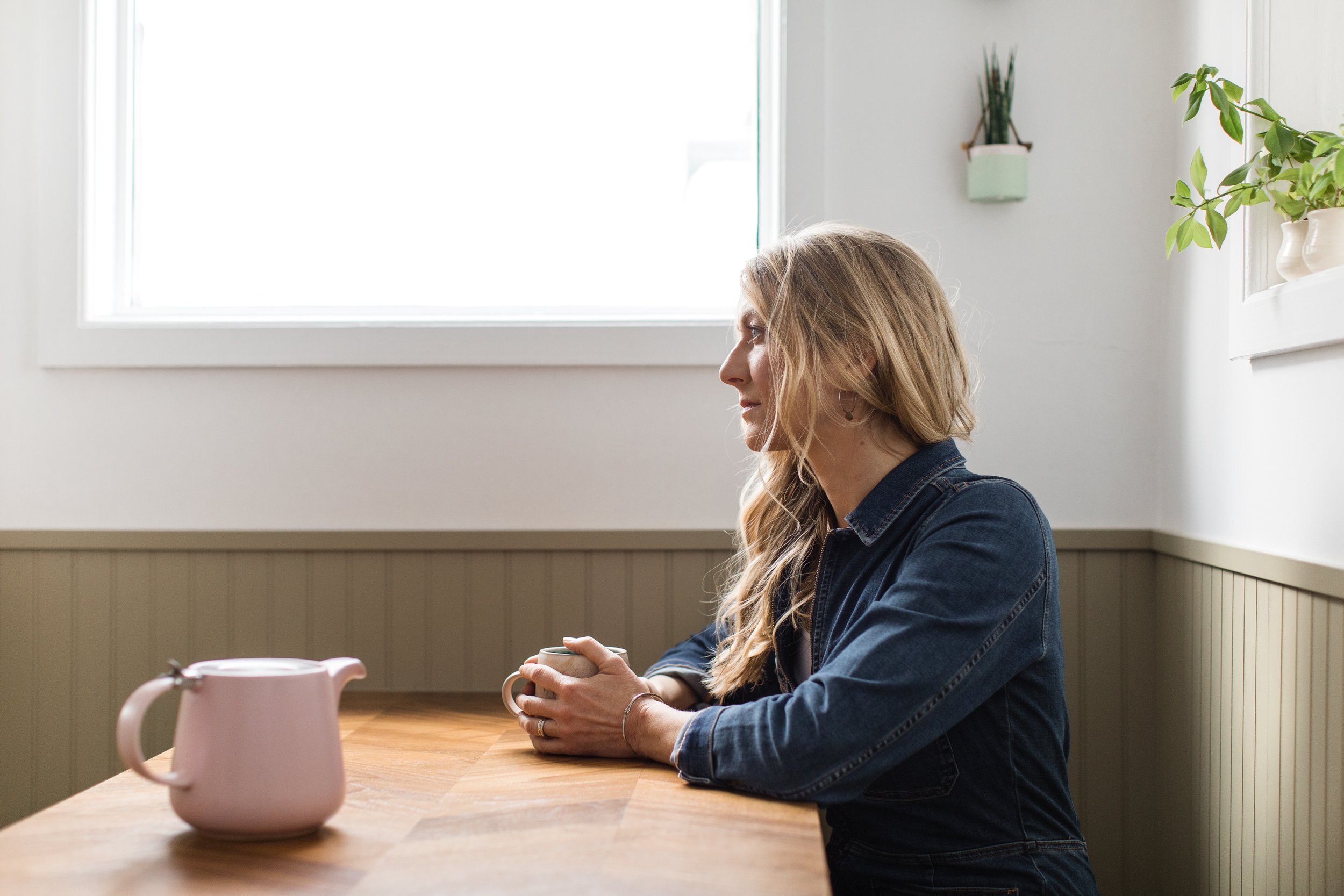In the face of a pandemic and during a time when it certainly feels like the shit has hit some kind of massive fan, especially if you have big responsibilities in your work or you run your own biz, if you are at all concerned with the condition of the planet and the future of resources, economy, food, and agriculture, AND absolutely, if you ALSO have children, there is no wondering why there are so many of us suffering from or supporting others who are suffering from all kinds of levels of anxiety. The stage is certainly set.
BUT, what if the anxiety itself was having more of a damaging effect on you than your life struggles?
The reasons we are suffering so greatly from anxiety are not a mystery, given the state of the world, but the long term effects of prolonged high or low levels of anxiety or stress in the body are deeply concerning.
Detrimental Health Effects of LONG TERM Anxiety:
Decreased immune system function
Decreased respiratory function, potential to worsen symptoms of asthma
Potential increased risk of depression, short or longterm
Potential influence on development of long term mental disorders/dysfunction
Potential increase in headaches, migraines, insomnia, muscle tension
Potential increased risk of digestive dysfunction and digestive disorders: SIBO, Dysbiosis, IBS, Crohn’s
As with all physiological reactions, anxiety plays an important role in your body: it triggers your flight-or-fight stress response and releases a flood of chemicals and hormones, like adrenaline, into your system. This initial reaction, in short bursts, increases your pulse and breathing so that your brain can receive more oxygen. This prepares you to respond appropriately to an intense situation, such as an emergency or when you are being chased by a lion (also an emergency).
But if you repeatedly feel anxious and stressed, even at low levels, or it lasts a long time, your body never gets the signal to return to normal functioning, which can create a cascade of detrimental effects on the body, weakening the immune system, stressing the nervous system, taxing the digestive system, and leaving the body feeling tired and drained.
Where are your anxiety levels at?
Signs & Symptoms of Anxiety
Excessive Worrying
Feeling Agitated
Restlessness
Insomnia/Troubles Sleeping
Fatigue
Difficulties Concentrating
Irritability/Mood Swings
Tense Muscles
Panic Attacks
Difficulty in Social Situations/in Social Settings
Irrational/Intense & Persistent Fears
Depression/Persistent Sadness or Feelings of Defeat/Failure
Dysfunctional Eating Behaviours
You can relate?
Listen, don’t let this list of reminders bring you down any more than you already are. Rather, allow it to inspire you or light a nice, gentle, but quite hot, fire under your cute little buns, because this is real and it matters and you cannot recover from troubles with anxiety by doing nothing.
We move forward by moving forward.
So, here’s the best part! You CAN get a better handle on your anxiety (without medication) by simply making some much needed, and rather pleasant 😉, adjustments to your diet, your lifestyle, and by adding in a little extra support.
Holistic Ways to Get A Handle On Your Anxiety
Get Real. If you aren’t being realistic & forth coming about your struggles with anxiety, then forget it. Being real about what’s actually, truthfully, going on is THE FIRST STEP in a move towards healing. Yes, it’s scary as f#@% to accept and admit that you are struggling, but remember, it’s like that for everyone. You will be a way stronger human for stepping into the real than you would if you could never be honest enough with yourself to accept & work through it.
Ditch The Junk. You cannot make advances with your health without letting go of what is holding you back, it just isn’t possible. So whether this be past trauma, an unsettled conflict or toxic relationship, issues with alcohol or addiction, or unhealthy food choices and habits, whatever it is that’s created that road block for you, MUST MOVE! You know what this is, I know you do. Getting started is the hardest part, after that, you will feel free and light and a whole lot better. Can you enlist the help of a professional to coach you past that roadblock? Is it time to call your long lost friend, your Mom, or ex partner. Maybe it’s time you joined a women’s circle or learned some tapping, showed up for an acupuncture appointment or called your Nutritionist 😉 Whatever it is, remember that anxiety is a symptom. You cannot throw a bandaid on anxiety and expect it to get better. Getting to the root of the issue is paramount to longterm healing.
Nurture Your Body. You cannot expect to feel well if you do not eat well, period. The quality of your diet directly affects your mood, your brain, your nervous system, your gut, your sleep, your energy levels, and how you manage stress and difficult situations. You don’t really need me to tell you this, but it’s good to hear it. Best foods for anxiety are WHOLE, REAL FOODS: fruits, vegetables, whole grains, nuts, seeds, good quality fats, beans, legumes, organic, in season, and locally sourced as much as possible. Too much of the nasties will simply make you feel terrible and contribute to anxiety levels. Things to watch out for: alcohol, caffeine, sugar, processed foods, chemical additives, excess dairy, meat, wheat & gluten.
Balance Your Blood Sugar. Far too often I see a strong correlation between rollercoaster blood sugars and anxiety (also depression and other mood & mental ailments). If you are not eating good food at regular intervals throughout the day (and instead, consuming excess coffee & lots of sugar), you will not feel balanced. Rather, you will wind up feeling up & down & all over, with a restless mind, a racing heart, and a mood that won’t ever stay in one place. Whole, real foods, every 2-3 hours throughout the day, with water in between, is a much better recipe for stability. Keeping an eye on your macronutrient balance is also helpful: are you consuming enough protein, carbohydrates, and fat, regularly? If you need help with this, I happen to know an expert 😉
Exercise. Move your body. Often. And outdoors as much as possible. Exercise is an amazing way to quiet the mind, oxygenate the cells, encourage gentle detoxication, encourage good sleep, regulate nervous system function, support the immune system, and move pent up emotions & worry. If you are not getting regular exercise (particularly outdoors!), you may be missing out on the NUMBER ONE doable thing that can help you reduce your anxiety. As we move into the Fall season, how can you make room for regular exercise in your life?
De-Stress. I often ask my clients: “What is stressing you most?”. Their answers are often surprising. Maybe it’s the usual things: kids, work, money, the hectic life scramble. But maybe it’s something else: their health or struggles with self esteem, an unresolved or abusive relationship, or a lack of passion/desire in life. How can you let go or work through what is stressing you most? How can you decrease your current stress and make room for things you love and fill you with light & excitement?
Try Smart & Careful Supplementation. As a practitioner, this is not a place I start with a client because we want to be careful not to rely on an outside source to fix the problem, such as with supplements. However, they can be useful during times of intense stress or anxiety, and also to help support the body while the real work happens. Some supplements that may be beneficial: B vitamin complex (energy), Essential Fatty Acids (anti-inflammatory), MCT Oil (cognitive support), Probiotics (gut support), Vitamin D (immune), Medicinal Mushrooms (immune), Adaptogenic Herbs (help the body deal with stress - ashwaghanda, siberian ginseng, maca, schisandra, rhodiola rosea), and Turmeric (reduce inflammation). Always consult with a health care practitioner before choosing supplements or herbs, a professional can help you choose the right ones for you.
Seek Support. The strongest people are the ones that put up their hands to say: “I need some help over here”; they accept and listen to the help given, and use it to move forward & through their roadblocks. Asking for support can look different to everyone. For some, it’s leaning on a good friend or partner, and for others, it is emerging themselves in a complete treatment program. Figure out what it is you need and put your hand up. There’s a good reason why there is so much wonderful and accessible help for us out there, it’s because we ALL NEED HELP every once in a while. Put your pride aside, step your bravest foot forward, and make a difference in how you feel and how you live your life.
Don’t let your anxiety be the thing that gets in the way of being the person you want to be and know you are.
Let the current state of the world and all its unsettling & disturbing nature not be what drags you down, but rather, be what empowers you to make change happen.


